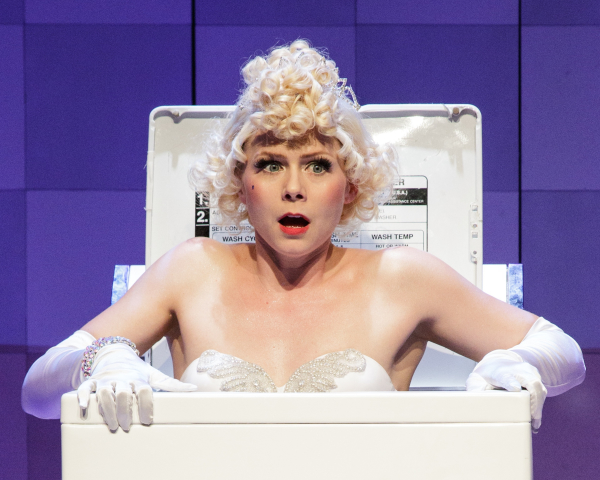Lives of the Saints

(© James Leynse)
Sometimes it's nice to go out for an evening of tapas rather than a big three-course meal. In that spirit, David Ives has served up some scrumptious theatrical morsels with Lives of the Saints, six one-act plays now running in a production of Primary Stages at the Duke on 42nd Street. Under the masterly direction of John Rando, Ives' plays take a comedically absurdist look at the human condition, from the natures of friendship and reality to the pain and joy of love.
Arnie Burton, Carson Elrod, Rick Holmes, Kelly Hutchinson, and Liv Rooth, who all take on multiple roles, deliver great performances, starting in Act 1 with The Goodness of Your Heart, in which two friends, Del (Burton) and Marsh (Holmes), drink beers together and suddenly find themselves locked in a battle of wills over Marsh's suggestion that Del buy him an expensive TV…just because. Soap Opera tells the story of a repairman (Elrod) who falls desperately in love with a washing machine (Rooth). In Enigma Variations, a woman portrayed by two identical-looking actresses (Rooth and Hutchinson) are psychoanalyzed by a doctor portrayed by two identical-looking actors (Burton and Holmes) in an absurdist take on reality and personality.
The second act includes the riotous Life Signs, in which a man learns a little too much information about his recently deceased mother and his wife in a startling way. It's All Good examines a man (Holmes) who takes a trip and strangely meets his double (Elrod), learning in the process what his life might have been if he had made a different choice long ago. And the title-segment closer shows the friendship of two elderly Polish women (Hutchinson and Rooth) as they prepare for a funeral reception — accompanied by a sound-effects team (sound wonderfully designed by John Gromada).
At about 20 minutes apiece, this production is a boon for those with short attention spans, but Ives' witty, often hilarious stories and trenchant wordcraft make running times an afterthought. (Six plays were performed on the evening I attended, though a seventh, Babel's in Arms, was listed in the program.) Not all the plays pack the same punch: Enigma Variations feels a little too clever for its own good, its repetitious dialogue and metaphysical musings quickly losing their tang, and It's All Good, despite its intriguing Twilight Zone-style story, rushes toward an unsatisfying conclusion.
But in the context of the entire show, these feel like quibbles. Ives' verbal brilliance and exuberant humor shine throughout. His meditations on friendship in the funny and frustrating opener, The Goodness of Your Heart, and the funny yet poignant final play, had audience members buzzing with their implications. Soap Opera, with the delightfully campy Rooth and Elrod engaging in groan-inducing, pun-heavy dialogue, looks gleefully at our love affair with machines. And the show's most uproarious piece, Life Signs, featuring a hysterical performance by Hutchinson, combines absurdity with an examination of the outrageous secrets, amorous and otherwise, that we hide from the world.
Rando's crisp yet lighthearted direction gives these plays surprising twists, as in the "deathbed" scene in Life Signs. Beowulf Boritt's dynamic, deceptively simple-looking checkerboard set, with its secret doors and moving floor, transforms (with the help of Jason Lyons' superb lighting design) to suit each play. Anita Yavich's costumes (her apt choices for Soap Opera stand out) are the icing on the cake. Much like a tasting menu, there's something in this collection of one-acts to satisfy every theatergoing palate.










